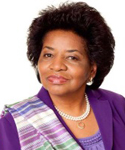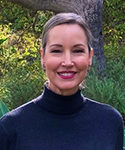Diversity and Inclusion Council
Mission Statement
The Diversity and Inclusion Council commits to actively support an inclusive, equitable, culturally competent educational community that respectfully welcomes, engages, and supports the richness of diversity (e.g., cultural, racial, gender, sexual orientation, class, geography, religion, learning style, able-bodiedness, age, and appearance).
Diversity in the student body, faculty, staff, board, and administration is an essential component of the learning experience at Pacifica Graduate Institute. The purpose of the Diversity and Inclusion Council is to nourish an atmosphere at Pacifica that promotes, respects, and encourages diversity in its fullest sense.
In order to achieve greater diversity, concerted effort is necessary in decision-making processes, recruitment practices, and retention efforts. To build an atmosphere of hospitality toward differences, Pacifica encourages cross-cultural dialogue, explores pedagogies that enlist awareness of diversity in the learning process, and regularly reviews its policies and procedures, as well as the curriculum with regard to issues of diversity.
Appreciation for diversity begins with thoughts and attitudes that support multicultural environments. Pacifica engages in a process of self-evaluation regarding institutional, collective, and individual racism, and other bias in order to work toward a more inclusive learning environment. To this end, Pacifica encourages regular dialogue on issues of diversity among the staff, faculty, and student body. Depth psychology is a historical, philosophical, and practical conversation of diverse voices with multiple, yet related, points of view on interiority, culture, context, the unconscious, imagination, dialogue, transformation, myth, symbol, symptom, and healing.
Practitioners of depth psychology who are struggling to become conscious about issues of cultural bias, Eurocentrism, xenophobia, colonialism, and domination in the field find that many theories of depth psychology can be used as a valuable guide to the hosting of diversity. Depth “psychologies” may more aptly describe the complexity of voices that comprise any situation: intrapsychic, interpersonal, intercultural, or interspecies. They ask us to acknowledge our point of view at any moment as one among many. This attitude helps allow space for alternate perspectives to emerge, thus augmenting, challenging, confirming, and critiquing points of view with which we have identified. Depth psychologies see this discipline as a necessary and ongoing process that is sensitive to shifts in what calls from the margins of a culture at any particular time.
The movement from singularity of voice to polyphony, from identification with a fixed viewpoint to a critical and contextualizing viewpoint, parallels psychology’s own contemporary movement from a universalist standpoint that often covered over cultural context and bias. Just as the individual seeks to open a space for other viewpoints to emerge, some depth psychologies are presently struggling to be clear about their origins in Euro-American culture and the implicit values underlying their predominant foci of research, clinical and community practice, and favored methodologies.
This struggle allows psychology thoughtfully to extend its research and clinical and community practice to groups and issues previously under-represented by a more monocultural discipline, by working in concert with members of such groups. Therefore, at Pacifica, we seek to view diversity within the container of plurality, tolerance, and debate.
In accord with Pacifica’s commitment to depth psychology, we actively support an educational environment that respectfully welcomes the richness of cultural, racial, gender, sexual orientation, class, religion, learning style, able-bodiedness, age, appearance, political affiliations, and other even as yet unnamed differences, which all who study and work in this Institute bring as gifts for a learning community.
Diversity and Inclusion Council Handbook:
Council Members:

Fanny Brewster, Ph.D., M.F.A., Core Faculty & Chair of the Diversity and Inclusion Council
Dr. Fanny Brewster is a Jungian analyst and Professor at Pacifica Graduate Institute in the Integrative Therapy and Healing Practices Department. She is a writer of nonfiction including African Americans and Jungian Psychology: Leaving the Shadows, Archetypal Grief: Slavery’s Legacy of Intergenerational Child Loss, and The Racial Complex: A Jungian Perspective on Culture and Race. Dr. Brewster is an international lecturer and workshop presenter on Jungian related topics that address African American Culture, issues of Diversity and healing cultural trauma through Creativity.

Dianne Travis-Teague, Alumni Relations & Co-Chair
Dianne Travis-Teague is the Director of Alumni Affairs who is dedicated to creating and maintaining pathways for alumni participation that advance the goals of the Institute and partnering with colleagues to identify, cultivate, and steward alumni giving in a multiplicity of ways. She believes that the alumni are, in so many ways, the blood soul of Pacifica and that their work is an expression of Pacifica’s mission, to tend to the soul of and in the world.

Bennie Harris, Student Representative
Bennie Harris is a 3rd-year Clinical Psychology student enrolled in Pacifica’s Psy.D. program. He suggests that his life has come full circle, growing up on military installations in the United States and abroad during the Vietnam War, then seeing first-hand the residual effect of war, racism, and marginalization on his Central California coastal community during high school. His time served in the United States Marine Corps, time served in Iraq, and experience with Veteran’s suffering through homelessness, has rekindled his desire to be a part of the solution. He’s committed to asking the questions that invite ALL parties to reconsider their cherished biases in consideration of our common humanity and potential for good.

Vanessa Black, PGIAA Representative
Vanessa Black is a homeopath in private practice. Her practice includes teaching and working as a consultant with homeopaths and homeopathic students. Utilizing depth psychological, somatic, and homeopathic perspectives, she is currently writing a series of articles looking at the relationship between socio-cultural issues and acute/chronic illnesses. As a student in the Depth Psychology/Somatic Studies Ph.D. program at Pacifica Graduate Institute, Vanessa’s doctoral research examines the phenomenon of transferences in dyadic relationships.

Nuria Ciofalo, Ph.D., Faculty Representative
Nuria Ciofalo is Core Professor of the Community, Liberation, Indigenous, and Eco-Psychologies specialization at Pacifica Graduate Institute. Born in Mexico, she gained her B.A. and first M.A. in Clinical and Social Psychology in Germany where she specialized in psychoanalytic theories. Her M.A. in Urban and Regional Planning and Ph.D. in Community Psychology at the University of Hawaii immersed her in the Native Hawaiian sovereignty movement and healing practices. She has worked with Indigenous communities in Hawaii, Northern, Central, and Southern Mexico for more than 40 years. She teaches Indigenous psychologies centering Indigenous, cosmologies, epistemologies, axiologies and healing praxes in academic curricula applying participatory action research in partnership with communities. She has published in the areas of participatory youth action research, program evaluation, decolonial, depth community psychology, and Indigenous knowledge systems.

Indhushree Rajan, Ph.D., Faculty Representative
Dr. Indhushree Rajan is a Licensed Psychologist (PSY 30808). Dr. Rajan is also a faculty member in the clinical and depth psychology programs at Pacifica Graduate Institute in Carpinteria, CA., and sees clients in private practice in Beverly Hills, CA. As an educator, counselor, and advocate in the nonprofit sector and at-risk/alternative education system, Dr. Rajan spent over 15 years working with child, adolescent, and adult survivors of complex trauma (physical, sexual, medical, and psychological). In clinical settings, she has done therapy and assessment work with survivors of complex trauma for 10 years. Dr. Rajan has spent her entire career working in diverse cultural and socio-economic communities in California and India. Dr. Rajan is also an internationally published author and public speaker, who has written and spoken extensively on topics including: human trafficking, modern-day sexual slavery and forced prostitution, immigration and refugee trauma, feminism, post-coloniality, social justice, indigenous rights, and cultural issues in therapy and research. For the past 12 years, Dr. Rajan has been doing research and clinical work with sex trafficking survivors in California and India. In 2008 Dr Rajan founded Project Satori and has since been working to realize its mission to provide comprehensive mental health care to survivors of human trafficking and their families worldwide; to promote education and advocacy around the global sex trafficking crisis, and to offer psychoeducational training services about sex trafficking prevention and treatment in California, and through global partner programs worldwide.

Lauren Lastra, Staff representative
Lauren Lastra, M.P.P.A., is the Director of Academic Affairs and Student Services who is committed to a just and mission-centered approach to Institutional life. She is a member of Pacifica’s Diversity and Inclusion Council, President’s Council, and President’s Task Force on Campus Culture and Morale. In 2020, she is serving as the inaugural Staff Representative on the Board of Trustees. Prior to coming to Pacifica, Lauren lived in the Valparaiso region of Chile where she served as an Educator for the United Nations Development Program. She studied multicultural literature (B.A.) at University of California, Berkeley and public policy and administration (M.P.P.A) at California Lutheran University.

Norma Mesa, Staff representative
Norma Mesa, M.S., has been in the Human Resources field for over 20 years and has worked in various industries including transportation, manufacturing, education and not-for-profit agencies. As a Hispanic woman, she takes pride in her culture and her first language of Spanish. Norma has a strong commitment to diversity, equality and inclusion. She has served on many committees to promote and train staff on diversity issues in the workplace. She received her B.S. from San Francisco State University and her M.S. in Human Resources Management from Golden Gate University.

Lisa Runyen, JD, Institutional Management Council (IMC) representative
Lisa Runyen is the ADA Coordinator in the Office of Student Disabilities. Lisa works to mitigate barriers faced by students with documented disabilities who seek equal access to, and enjoyment of the academic experience at Pacifica. She works collaboratively to establish academic accommodations tailored to each student’s specific challenges and learning styles. Lisa previously served on the Board of Directors for Hearts Therapeutic Equestrian Center in Santa Barbara, a non-profit adaptive horseback riding program for children and adults of all abilities. In her spare time, Lisa enjoys riding her horse on the trails of Santa Barbara’s open spaces and back country.

Rica Toribio, Ed.D., Staff representative
Rica Toribio is the Senior Director of Enrollment Management at Pacifica Graduate Institute. As foreign-born Filipino immigrant, Rica has personally experienced and continue to behold the plight of underrepresented communities in California collegiate campuses. She had to navigate the US higher education system as a new arrival inchoately acculturating into its new milieu. During her undergraduate studies at UCLA, she was able to observe fellow Filipino Americans, seeing their scholarly trajectories based on their socioeconomic backgrounds and their parents’ level of education, but without acknowledgement of their academic or extra-curricular achievements that could be attributed to their ethnicity or culture, since Filipinos have become cultural straddlers because of the decades of western influence. She has therefore devoted her professional and scholastic endeavors to streamlining administrative processes to allow for a multitude of ethnic voices to be heard and represented; as well as to allow an understanding of the necessity to digress from panethnic labeling that elicit misguided assumptions about specific groups. She studied English Literature (B.A) at the University of California, Los Angeles; English Literature (M.A.) at California State University, Los Angeles; and is completing her Doctoral in Educational Leadership (Ed.D.) at California State Polytechnic University, Pomona.

Heesun Kim, LCSW, Student representative
Heesun Kim is a 2nd-year student at Pacifica’s Depth Psychology Ph. D. program with a specialization in Integrative Therapy and Healing Practices. Born and raised in South Korea, she had worked in NYC with a background in both clinical social work and art. She worked with trauma patients in the city shelters and the victims of domestic violence, sexual assault, and human trafficking. She is also a Somatic Experiencing (SE) practitioner and certified yoga teacher at the Integral Yoga Institute. She worked on the Grieving Tree project in NYC and Pacifica’s Lambert campus and wants to continue blending the arts and community-based healing practices into purposeful work with the diverse and marginalized communities.

